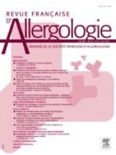
Revue Francaise d Allergologie
Scope & Guideline
Advancing Allergy Research for Tomorrow's Innovations
Introduction
Aims and Scopes
- Clinical Allergology:
The journal publishes studies related to the diagnosis, management, and treatment of various allergic conditions, including asthma, food allergies, and allergic rhinitis. - Epidemiological Research:
It features epidemiological studies that investigate the prevalence, risk factors, and socio-economic impacts of allergies across different populations. - Immunotherapy and Treatment Innovations:
Research on novel therapies, including oral immunotherapy and biologics, is a core focus, aiming to provide insights into effective management of allergic diseases. - Pathophysiological Mechanisms:
Investigations into the underlying mechanisms of allergic reactions, including immunological responses and molecular interactions, are frequently explored. - Patient Quality of Life and Psychosocial Aspects:
The journal emphasizes studies that assess the quality of life of patients with allergies, considering the psychological and social dimensions of living with allergic conditions. - Environmental and Dietary Influences:
Research exploring the impact of environmental changes, dietary habits, and climate on allergy prevalence and management is highlighted.
Trending and Emerging
- Personalized Medicine in Allergy Treatment:
There is a growing focus on personalized approaches to allergy treatment, including tailored therapies based on individual patient profiles and responses. - Impact of Climate Change on Allergies:
Recent studies are increasingly addressing how climate change affects allergen levels, distribution, and the prevalence of allergic diseases, highlighting a timely and critical area of research. - Food Allergy Management and Education:
Emerging themes include innovative strategies for managing food allergies, with an emphasis on patient education and individualized care plans. - Biologics and Advanced Therapies:
Research on biologic treatments for severe allergic conditions is on the rise, reflecting advancements in targeted therapy and immunomodulation. - Mental Health and Allergy Interactions:
There is an increasing awareness of the psychosocial impact of allergies, with studies focusing on mental health issues related to living with allergic conditions. - Integration of Technology in Allergy Management:
The use of digital health tools and telemedicine in allergy management is becoming more prevalent, as researchers explore their effectiveness in patient care.
Declining or Waning
- Traditional Allergen Testing Methods:
As novel diagnostic tools and molecular techniques gain traction, traditional methods for allergen testing may be receiving less attention in recent publications. - Generalized Allergy Awareness Campaigns:
Research on broad public awareness campaigns for allergies seems to be declining, possibly due to a shift towards more targeted and specific educational initiatives. - Historical Perspectives on Allergy:
Fewer studies appear to focus on the historical evolution of allergy management and understanding, indicating a shift towards contemporary issues and modern therapeutic approaches. - Occupational Allergies:
There seems to be a reduced emphasis on research specifically addressing occupational allergies, potentially overshadowed by broader environmental and lifestyle factors. - Food Allergy Diversity Studies:
While food allergies remain a significant topic, the exploration of diverse food allergies without specific context may be decreasing, as the focus shifts to more prevalent allergens.
Similar Journals
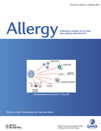
ALLERGY
Illuminating Innovations in Allergy and Immunology.ALLERGY is a leading international journal published by WILEY, dedicated to advancing the understanding of allergic diseases and immunology. With an ISSN of 0105-4538 and an E-ISSN of 1398-9995, this esteemed journal has been at the forefront of the field since its inception in 1948 and continues to publish high-quality research up until 2024. Positioned in the Q1 category for both Immunology and Allergy, ALLERGY ranks impressively within the top percentiles of its categories, underscoring its significant impact, as reflected in its Scopus rankings (#11 out of 233 in Immunology and Allergy, and #14 out of 236 in Immunology and Microbiology). Researchers and practitioners accessing this journal can expect a rigorous selection of peer-reviewed articles that address current challenges, innovative therapies, and advancements in the immunological sciences. Although it is not an open-access journal, ALLERGY remains vital for academics, healthcare professionals, and students alike, fostering a deeper understanding of the mechanisms and treatments associated with allergies.

Current Allergy & Clinical Immunology
Unlocking insights for a healthier tomorrow.Current Allergy & Clinical Immunology is a vital peer-reviewed journal published by the Allergy Society of South Africa, focused on advancing the field of immunology and allergy medicine. With an ISSN of 1609-3607, this journal offers crucial insights and research findings pertinent to the understanding and treatment of allergic conditions. Operating from South Africa, it features contributions from a diverse range of authors and professionals in the field. Published from 2008 to 2024, the journal plays an essential role in disseminating current knowledge, even as it holds a Q4 ranking in Immunology and Allergy and is positioned at the 4th percentile based on Scopus rankings. While not open access, it remains an important resource for researchers, practitioners, and students looking to stay informed on emerging trends and breakthroughs in allergy and clinical immunology.
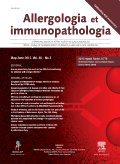
ALLERGOLOGIA ET IMMUNOPATHOLOGIA
Connecting Researchers to Transform Allergy and Immunology InsightsALLERGOLOGIA ET IMMUNOPATHOLOGIA is a distinguished academic journal dedicated to the field of immunology and allergy, published by CODON PUBLICATIONS, based in Singapore. With its ISSN 0301-0546 and E-ISSN 1578-1267, this journal aims to provide an open platform for researchers and practitioners to share their findings, emphasizing topics related to immunopathology and respiratory health. Covering a broad scope from 1973 to 2024, it currently holds a notable position in several category quartiles, including Q3 in Immunology and Allergy, and Q3 in Pulmonary and Respiratory Medicine as of 2023. Despite the absence of an open access option, the journal maintains an essential role in disseminating pivotal research, reflected in its Scopus rankings that position it within the core of its discipline. With an impact factor acknowledging the significance of its contributions, ALLERGOLOGIA ET IMMUNOPATHOLOGIA continues to be a vital resource for ongoing education and advancement in immunological and allergic research.
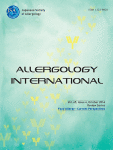
ALLERGOLOGY INTERNATIONAL
Exploring breakthroughs in immunology and allergy.ALLERGOLOGY INTERNATIONAL is a prestigious, peer-reviewed journal dedicated to advancing the field of immunology and allergy research. Published by the Japanese Society of Allergology, this Open Access journal has been democratizing knowledge since 1996, providing a platform for the latest findings and clinical practices in the management of allergic diseases. Its impressive Q1 ranking in both Immunology and Allergy** and **Medicine (miscellaneous)** categories in 2023 highlights its significance in the global scientific community, with a commendable Scopus ranking of #31 out of 233 in the field of immunology. The journal's focus on innovative research, comprehensive reviews, and case studies ensures that it remains a vital resource for researchers, healthcare professionals, and students alike. Situated in Tokyo, Japan, it continues to bridge gaps in allergy-related health information and foster international collaboration among scholars.
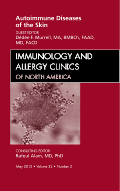
IMMUNOLOGY AND ALLERGY CLINICS OF NORTH AMERICA
Leading the Charge in Allergy and Immunology InsightsIMMUNOLOGY AND ALLERGY CLINICS OF NORTH AMERICA is a premier journal published by W B SAUNDERS CO-ELSEVIER INC, focusing on the dynamic fields of immunology and allergy. With an ISSN of 0889-8561 and an E-ISSN of 1557-8607, this journal has consistently ranked in the Q2 category in both Immunology and Immunology and Allergy as per 2023 metrics, underscoring its critical role in academia. It provides cutting-edge research, comprehensive reviews, and practical insights that cater to the needs of researchers, clinicians, and students alike. Though the journal is not open access, it remains an essential resource for those involved in advancing knowledge and clinical practice in allergy and immunology. With its converged years stretching from 1987 to 2024, the journal serves as a rich repository of scientific advancements, fostering progress in diagnosis, treatment, and prevention of allergic diseases and immune disorders. Positioned within the United States and based in Philadelphia, it plays a vital role in promoting scholarly communication within these impactful fields.
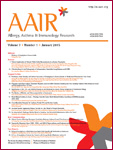
Allergy Asthma & Immunology Research
Pioneering research for a healthier tomorrow.Allergy Asthma & Immunology Research, published by the Korean Academy of Asthma Allergy & Clinical Immunology, is a leading journal dedicated to advancing the fields of immunology, allergy, and respiratory medicine. With an ISSN of 2092-7355 and an E-ISSN of 2092-7363, this esteemed publication has been a cornerstone for researchers and practitioners since its inception in 2009 and continues to disseminate critical findings through till 2024. The journal is ranked in the Q3 category in Immunology and the Q2 category in Immunology and Allergy as well as Pulmonary and Respiratory Medicine, illustrating its impact in these vital fields. With a solid Scopus ranking in multiple sub-disciplines, the journal not only contributes to the scientific discourse but also promotes innovative research and clinical practices. Although currently operating without an open access model, the journal remains highly regarded for its thorough peer-review process and commitment to academic excellence, making it an essential resource for professionals, researchers, and students passionate about advancing knowledge in allergy, asthma, and immunology.

AIMS Allergy and Immunology
Exploring Breakthroughs in Allergy ResearchAIMS Allergy and Immunology is a prestigious open access journal dedicated to advancing knowledge in the fields of allergy and immunology. Published by the American Institute of Mathematical Sciences (AIMS), this journal provides a vibrant platform for researchers, practitioners, and scholars to share groundbreaking findings and insights. Recognized for its commitment to disseminating high-quality research since its inception in 2017, AIMS Allergy and Immunology contributes significantly to the understanding of complex immunological mechanisms and allergic responses, thus playing a pivotal role in enhancing clinical practices and therapeutic strategies. With its ISSN 2575-615X, the journal aims to facilitate a robust exchange of ideas and promote collaboration within the scientific community. Researchers and practitioners are encouraged to access the latest studies and reviews, which are all freely available online, ensuring that vital information reaches a global audience without barriers. Together, we can tackle the challenges posed by allergies and immune disorders through rigorous scientific inquiry and innovation.

Frontiers in Allergy
Pioneering advancements in allergy and immune health.Frontiers in Allergy is a pioneering open-access journal published by FRONTIERS MEDIA SA, dedicated to advancing the frontiers of research in the fields of Immunology and Infectious Diseases. Launched in 2020 and based in Lausanne, Switzerland, this journal provides a dynamic platform for researchers, professionals, and students to share innovative findings and insights related to allergic disorders and their broader immunological implications. With a respectable Q2 ranking in both Immunology and Allergy and Infectious Diseases categories, as well as being indexed in Scopus, this journal is emerging as a significant resource for the scientific community. The open-access model ensures wide dissemination of valuable knowledge, facilitating collaboration and breakthroughs in treatments and understanding of allergies and related conditions. Frontiers in Allergy invites contributions that drive forward the understanding of immune responses, allergy prevention, and management, solidifying its role as a crucial player in the sustainability and growth of health sciences.

Asia Pacific Allergy
Pioneering Studies in Dermatology and ImmunologyAsia Pacific Allergy, published by Lippincott Williams & Wilkins, is a prominent academic journal dedicated to advancing research and clinical practice in the fields of dermatology, immunology, and allergy. With its ISSN 2233-8276 and E-ISSN 2233-8268, the journal provides a platform for innovative studies and reviews that cater to an international audience of researchers, healthcare professionals, and students involved in allergy and related disorders. Although it does not currently offer open access to its publications, the journal's robust output from 2015 to 2017 and its ongoing contribution to the literature from 2021 to 2024 showcase the evolving landscape of allergy research in the Asia Pacific region. Recognized in the 2023 Journal Citation Reports, it holds a Q2 ranking in Dermatology and a Q3 ranking in Immunology and Allergy, while its Scopus ranks further emphasize its significance within these domains, positioning it among the top journals in the field. As a source of cutting-edge research, Asia Pacific Allergy plays a vital role in fostering collaboration and knowledge dissemination, ultimately assisting in the betterment of patient care and treatment strategies across the region.
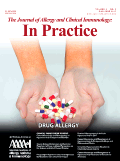
Journal of Allergy and Clinical Immunology-In Practice
Navigating the complexities of allergy management.The Journal of Allergy and Clinical Immunology-In Practice, published by ELSEVIER, stands as a leading platform in the field of allergy and immunology, specifically tailored for practitioners and researchers. With an impressive 2023 Q1 ranking in both the Immunology and Allergy categories, this journal demonstrates a significant impact within the academic community, evidenced by its Scopus rank #41 out of 233 and an impressive percentile rank of 82. The journal focuses on providing advanced studies, clinical findings, and innovative treatment methodologies that address current challenges in allergy and immunology, making it a vital resource for professionals in these fields. With a comprehensive coverage of relevant topics from 2013 to 2024, the journal continues to evolve alongside emerging trends and developments in clinical practice, fostering an environment conducive to scholarly research and application. Although it currently does not offer open access, authors and readers can access a wealth of information and contribute to ongoing dialogues through its robust publication platform.